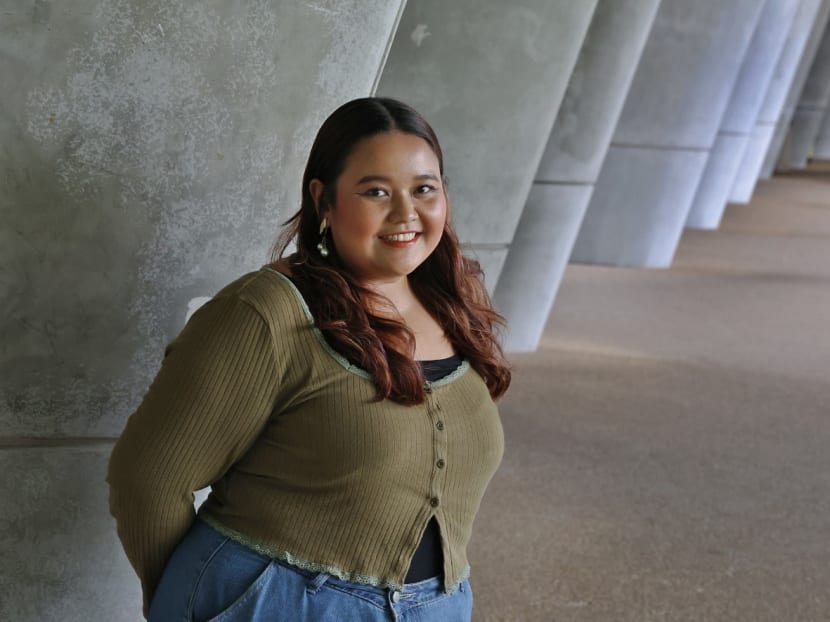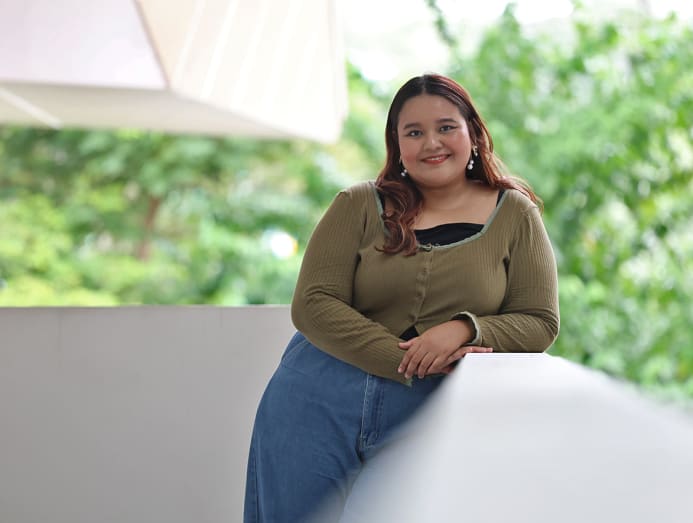'Cried every day': NUS grad draws on her mental health struggles to advocate for others with similar issues

Ms Aisha Shamsudin (pictured) overcame challenges during her four-year undergraduate journey, while her mother battled breast cancer and her family had financial strains.
Warning: This article contains references to suicide.
SINGAPORE — Just days before Ms Aisha Shamsudin started her degree course at the National University of Singapore (NUS) in 2020, a distressed friend called her to say that she wanted to end her own life.
Her friend did not proceed with the bleak plan, but the experience left Ms Aisha badly shaken. She also realised that years of being a confidante to her friends had caused her own “(emotional) tank to be filled” to the brim.
“The next day, I experienced an anxiety attack or something like that — I couldn’t stop crying and I experienced difficulties in breathing,” she told TODAY.
The 24-year-old described this incident as one of the “turning points” that made her take her mental health much more seriously and eventually seek proper help.
Compounded by challenges in her own life — such as her mother’s cancer diagnosis and her family’s loss of income — she was diagnosed with anxiety and major depressive disorder in 2021.
Once she spent some time managing her condition and “learning my capacities” though, Ms Aisha went on to help others as a mental health advocate at her residential college.
She also led some programmes aimed at helping the Malay-Muslim community, all while juggling the increasing academic demands in her later university years, eventually graduating with a Bachelor of Social Sciences with Honours (Distinction).
The communications and new media graduate’s achievements were mentioned by the NUS president in his speech at the university’s commencement ceremony last month.
Professor Tan Eng Chye said: “Despite all these challenges, she managed to make the most of her time at NUS, never passing up opportunities to grow and even support others.”
YEARS OF STRUGGLE
Ms Aisha, the older of two siblings, was already having emotional lows in the years leading to university.
During her A-Level year in 2018, her mother was diagnosed with breast cancer.
While the mother tried to downplay the seriousness of the situation — such as by telling her children that it was a stage 2 diagnosis when in fact it was stage 3 — it did little to stop Ms Aisha from worrying since she was “very close” to her mother.
Ms Aisha also chipped in to help with a larger share of household chores such as cooking and doing laundry in her mother’s stead.
Dealing with this at home and “friendship challenges typical of a 17-year-old” affected Ms Aisha greatly.
Emotionally, the once-outgoing teenager became "quite introverted, very quiet". And while she received a few academic awards in the first year of junior college, she did badly for her A-Levels and retook the examinations in 2019.
Things did not let up in her first year of university either.
As she was still worrying over her mother who had just completed chemotherapy treatment at that time, her father, a real estate agent, had his income severely reduced due to the Covid-19 pandemic.
SEEKING HELP
Ms Aisha told TODAY that she had already thought of seeking help as early as 2018 and was already tapping the Community Health Assessment Team (Chat) helpline run by the Institute of Mental Health.
However, to refer her for further help or get a diagnosis, the Chat team told her that she needed to inform her parents, due to her young age.
“I didn’t want to tell them. I don’t exactly know why, but I think it stemmed from me not wanting to burden them with this (mental health matter) at that time,” she said.
She did receive some support from NUS, such as from a residential fellow at the Ridge View Residential College where she was staying. Despite that, she knew she needed more help.
“During the summer break, I was just crying every day, I had no control over it,” she recalled.
At times, she woke up feeling unexplained sadness and having no motivation to go through her day, she added.
She finally went to a polyclinic to seek help at the end of the first academic year in May 2021 and got an appointment with a specialist more than three months later.
After being diagnosed, Ms Aisha took the next academic year to adjust to her medication and her school workload.
“With the diagnosis, I had to learn more about myself first. Learn my capacities first before picking up any (activities),” she said.
A ‘PERSONAL CAUSE’
Determined to make the best of her remaining tertiary years, Ms Aisha went all out to contribute back to society.
It began with being a mental health advocate through her residential college's Peer Student Supporters initiative, of which she eventually became chairperson in her final year.
Through this, she was trained to provide peer support for those who might face mental health issues, and organise events to promote mental well-being.
“This was definitely a personal cause, because I went through this myself and I wish people are more aware of (mental health challenges), and that people are not shy to talk about it,” she said.

Ms Aisha was also active in several activities relating to the Malay-Muslim community, a passion that was “subconsciously” formed by some “uncomfortable” experiences growing up as a minority, she said.
“I feel the (experiences) were due to a lack of empathy and understanding. That's why maybe subconsciously, I did things in my residential college to raise more awareness about culture or religion.”
Last year, she co-organised her residential college’s first Ramadan and Hari Raya event, Raya with Ridge, which on top of featuring celebratory performances, also included a sharing session for non-Malay-Muslim attendees to learn more about the minority community.
She was also active in the NUS Malay Language Society and took up leadership roles there.
Among other things, she led an outreach programme for pre-university students to understand what student life is like on campus, as well as an event to prepare undergraduates for life beyond graduation through talks with career and financial experts.
‘IT’S OKAY TO STEP BACK’
As her university life gathered pace, Ms Aisha was also making great strides on the emotional front.
“I only had a breakdown once, a day before my (thesis) submission. That changed from year one to year four,” she said, recalling how she cried frequently at the start.
She attributed her successes in part to the supportive friends and staff members at NUS.
For example, her thesis supervisor told her that university was “not just (about) studies” and encouraged her to pursue activities she was passionate about, as long as her studies were not compromised.
Her co-lead for one of the co-curricular activities was also a final-year student like her but with a different thesis submission timeline than her, so they took turns to take a backseat from the leadership role as and when needed.
“Having understanding friends or the people whom you work with (is important),” she said. “But of course, that comes with you establishing your own capacities earlier on.”
In the same vein, Ms Aisha said that it is important for young people to not get sucked into the rat race and to be aware of their own limits, for the sake of their mental and emotional health.
For example, as students, “it is normal to feel pressured” to want to pursue internships during every semester break out of fear of being left behind by their peers who are doing so.
“But if that break is the only time that you can catch a break for yourself, then just do it. It's okay to take a step back.”
If you, or anyone you know might want to talk to someone, you can reach out to one of the helplines below:
- Samaritans of Singapore: 1767 (call), 9151 1767 (WhatsApp/ text) and over email at pat [at] sos.org.sg (pat[at]sos[dot]org[dot]sg).
- Youthline (for individuals up to 35 years old): +65 6436 6612 (call), +65 8533 9460 (text) and over email at hello [at] youthline.sg (hello[at]youthline[dot]sg).
- Touchline by Touch Community Services: 1800 377 2252
- Tinkle Friend (for primary school aged children): 1800-274-4788








